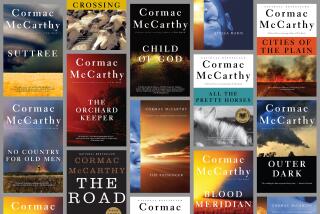O’Brian Back at the Helm : THE YELLOW ADMIRAL.<i> By Patrick O’Brian (W.W. Norton: $24, 262 pp.)</i>
- Share via
This is Patrick O’Brian’s 18th novel in the British seafaring adventures of Jack Aubrey and Stephen Maturin--that most improbably wonderful series of grown-up literary-historical flights of escapism. Here, in the year 1814, “The Yellow Admiral” refers not to a cowardice in battle but to an admiral without ships to command.
No use dwelling on the plot, though. The no-longer secret is that plots of O’Brian’s tales are like grapes to wine: pretty much essential, but not by themselves sublime. Virtuosity proves itself when a sip of the story actuates the senses and stirs cravings that become habits, no matter where you find yourself being taken.
At this point, it can be noted that there is a split in the reading public.
There are those already planning this afternoon’s trip to the bookstore. Their only reaction is: Thank god, Patrick O’Brian is still writing.
To you, I say, not a moment to lose. Peace is breaking out in Europe and the tension is exquisite. Aubrey is having an awful time ashore and afloat, but Maturin materializes with a plan. Except Napoleon pops a surprise.
Then, there are those of you readers still up for grabs.
Some of you have fallen behind on the O’Brian phenomenon. Perhaps a friend has already read the series and has babbled in the strange jargon of people in the know. It’s worse than not seeing the hottest movie on opening weekend. I know what you mean; I have been behind myself on things like this. And I admit that the British Royal Navy of 1800-1814 is one of those obscure subjects, like the habits of spiders, about which zealotry is off-putting.
So I offer you readers a token of reverse psychology. A typical die-hard O’Brian fanatic envies nothing so much as your good fortune in getting to start at the beginning, with all of Aubrey and Maturin’s amazing friendship still ahead of you--the taste of salt on the lips, the vivid moods of oceans, the shadowy French spies, the wonders of nature at a time when nature was still open to discovery, a headstrong woman named Diana, chamber music in the captain’s cabin and the cry above deck to warn of a possible enemy in sight, “Strange sail!”
Lastly, perhaps, there are those of you who missed entirely the concussion of heavy cannons in the literary salutes to O’Brian, whose popularity on these shores began only in 1991 when the writer was age 77.
Since then, so much has been written, enthusiastically and well, about his works that it seems a shame to resort to short-hand repetition. But: It has been said that this series is some of the finest historical fiction of our time, transforming a musty genre into art. Aubrey and Maturin have been described as better than Holmes and Watson, the equal of Quixote and Panza. By capturing an age before machine power as well as can be done, O’Brian has been called delicious counterpoise to the confusing onrush of the Information Age.
All this is true. And the marvel is, it hardly says enough.
Yes, O’Brian, born in Ireland and now living in France, takes some getting used to. Essential to the gift he gives is authenticity: By use of the courtly arcane language of the age, by reference to the obscure nomenclature of sailing a man-of-war and by regard for geography as seen not through contemporary eyes but from the perspective of a time when roaming navies were still connecting a vast and scattered world into one.
More to Read
Sign up for our Book Club newsletter
Get the latest news, events and more from the Los Angeles Times Book Club, and help us get L.A. reading and talking.
You may occasionally receive promotional content from the Los Angeles Times.






